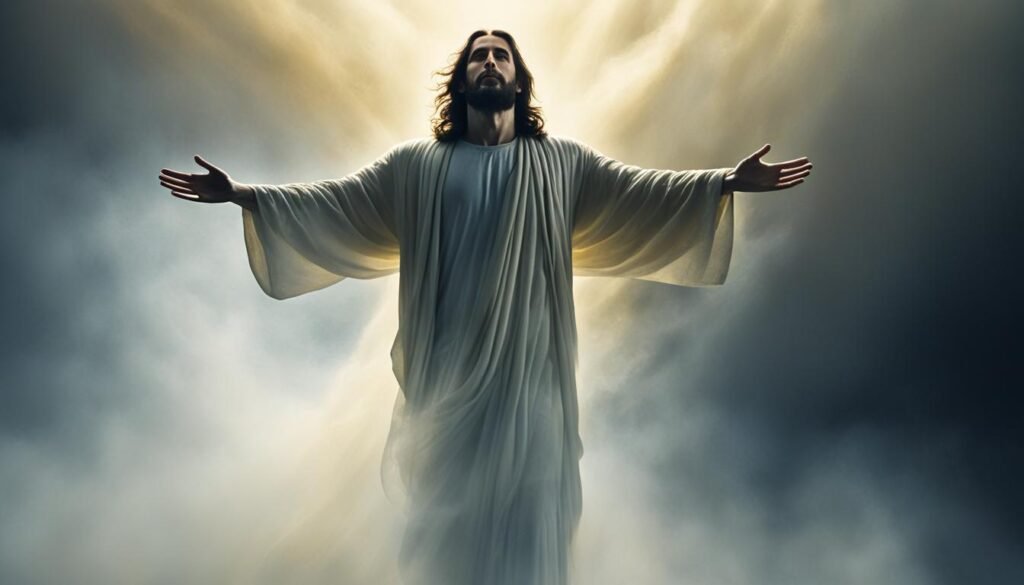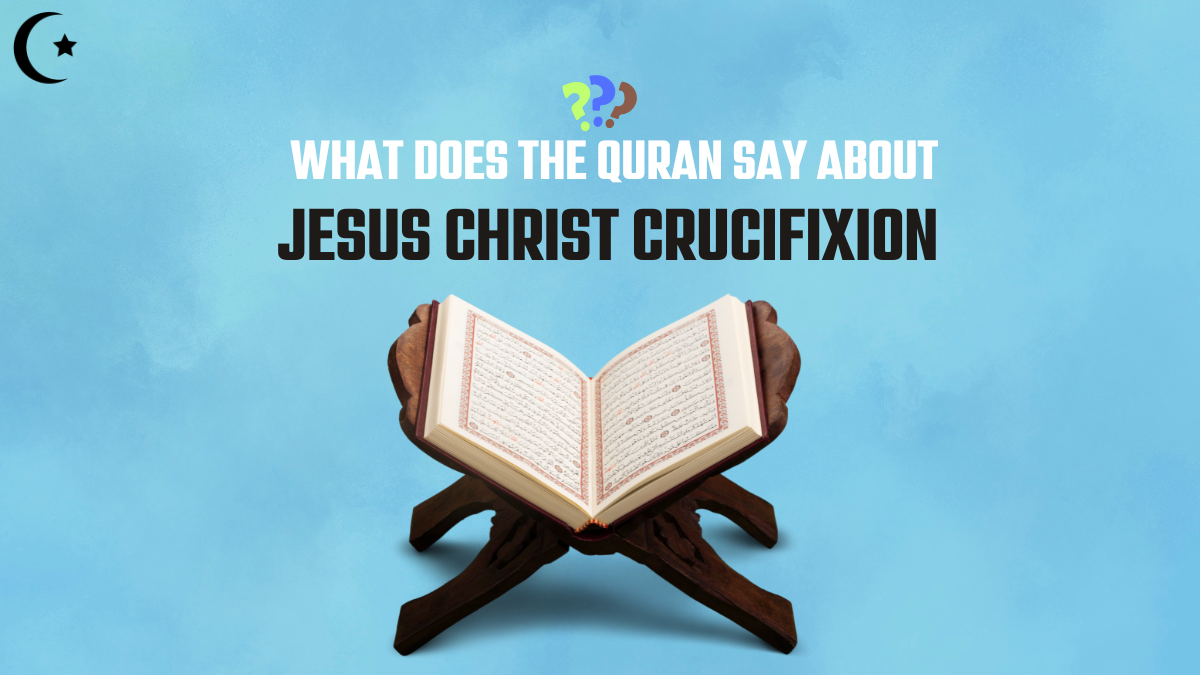What if everything you’ve been taught about Jesus Christ’s crucifixion didn’t actually happen? What Does The Quran Say About Jesus Christ Crucifixion? In the Islamic view, Jesus’ (ʿĪsā) story is different from what Christians believe. The Quran says Jesus was not killed or crucified. This raises big questions about his life and teachings.
This article looks into the Quran’s words and what they mean for Islam’s view of Jesus. It explores the deep theological ideas that shape how Muslims see this important figure.

In Islam, many believe Jesus was not crucified as the New Testament says. They think he went to heaven without dying. The Ahmadiyya community, however, has a different idea. They believe Jesus lived after the crucifixion and preached in India until he died naturally.
This variety in beliefs shows how different groups in Islam see Jesus. It also shows how these beliefs affect talks between different faiths today.
Understanding Jesus in Islam
Jesus (ʿĪsā) is a key figure in Islamic teachings, seen as a respected prophet and messenger of God. His role in Islam is different from how Christians see him, especially when it comes to his divinity and death.
The Quran talks about Jesus as the son of Mary (Maryam) and his miraculous birth. It shows his special bond with God. But, Islam does not accept the story of Jesus dying on the cross. Muslims believe someone else was crucified instead of him.
This belief also means Muslims don’t accept Jesus’ resurrection. They think he finished his work on earth and was taken up to God, as the Quran says in verses 4:157-158.
Islam sees Jesus as a prophet, emphasizing God’s unity and rejecting the idea of the Trinity. Even though Christianity and Islam have different views on Jesus, they both see him as having a unique connection with God. This reminds followers of both faiths of God’s greatness.
Islamic Perspective on Jesus Christ
In Islamic teachings, Jesus is a key and respected figure. He was born of the Virgin Mary and is seen as a miracle worker. The Quran talks about Jesus often, highlighting his role as a prophet in Islam. This is different from how Christians see him.
Islam doesn’t believe Jesus was crucified and raised again. Instead, it says he was taken up by God. The Quran says, “They did not kill him nor did they crucify him, but it appeared so unto them.” This shows the Islamic view, which questions the crucifixion story.
Many Muslims think someone else, maybe Judas Iscariot, was crucified instead of Jesus. This idea is similar to some early Christian thoughts. Both faiths see Jesus as very important. But, Islam doesn’t believe Jesus was divine, unlike Christianity.
To sum up, Islam sees Jesus as a big prophet in Islam. They don’t believe he was crucified like in Christian stories. For more on this, check out this in-depth analysis.
What Does The Quran Say About Jesus Christ Crucifixion
The Quran has a unique view on Jesus’ crucifixion. It says in Surah al-Nisa (Chapter 4) that Jesus was not killed or crucified. Instead, God raised him up. This goes against the Christian belief that the crucifixion is key to their faith.
The Reference in Quran 4:157-158
Quran 4:157-158 are key verses for Islamic beliefs on Jesus’ crucifixion. They say it seemed like he was crucified, leading to different views on his resurrection and atonement. This view clashes with Christianity, which sees Jesus’ death as crucial for making peace between humans and God.
Interpretations of Jesus’ Crucifixion in Islamic Theology
Islamic scholars have many ideas about Jesus’ crucifixion. One idea is that someone else was made to look like Jesus. This fits with the belief that no Muslim thinks Jesus was actually crucified. They believe Jesus was raised by God, keeping his soul pure.
There are differences in the stories of Jesus’ life and death in the Gospels. This leads to questions about their truthfulness. Early Christian writings and stories from non-Christian historians also show different views, adding to the debate.
Differences Between the Quran and the New Testament
The Quran and the New Testament show big differences in how they talk about Jesus Christ, especially about his crucifixion. Christianity sees Jesus’ death and coming back to life as key to their faith. They believe he is the Son of God who saves people. But, the Quran says Jesus wasn’t crucified. It says someone else took his place, changing the story from what Christians believe.
Crucifixion Accounts in Christianity vs. Islam
The New Testament has many stories that say Jesus was crucified. These stories come from people who were there and early writings that support this. But, the Quran disagrees, saying Jesus wasn’t crucified. This big difference changes how people see Jesus and his mission.
Historical Context of the Narratives
The stories in the Quran and the New Testament come from different times and places. The New Testament was written soon after Jesus lived, in a time that accepted and recorded his life and death. The Quran, however, was given in the seventh century, 600 years after Jesus. This time difference makes scholars question the Quran’s stories about Jesus, saying they might not have the same truth as the New Testament.
Mainstream Islamic Beliefs on Jesus’ Fate
In Islam, there are clear beliefs about Jesus that differ from what Christians believe. The main idea is that Jesus did not die on the cross, as the Qur’an says in chapter 4, verse 157. This belief is shared by many Muslims, from devoted followers to leading scholars.
Some argue against the idea that Jesus survived the crucifixion, like Ahmed Deedat. But most historians agree that Jesus was indeed crucified. This is backed by many sources, both within and outside the New Testament. Bart Ehrman, a scholar, confirms that Jesus was crucified by the Romans, a fact well-documented in history.
Islam offers different views on what happened to Jesus. Some believe someone else was crucified, making Jesus’ death an illusion. They point to the Gospel of Barnabas, a text not seen as a reliable source from Jesus’ time. Its late creation and its fit with Islamic teachings make its accuracy doubtful.
Yet, the idea that Jesus was not crucified is hard to accept when faced with strong historical evidence. Critics question the Qur’an’s claim about Jesus’ death. This debate raises questions about the Qur’an’s perfection and how it compares to historical facts.
You may also be interested in:
Alternative Views within Islamic Sectarianism
In Islamic beliefs, different views exist about Jesus’ crucifixion. The Ahmadiyya community has a unique take that stands out from most others. They believe Jesus survived the crucifixion and kept spreading his message after that.
Ahmadiyya Perspective on Jesus’ Crucifixion
Ahmadiyya beliefs say Jesus was taken down alive from the cross. They believe he went to India to work with the lost tribes of Israel. This idea is different from what most Muslims believe, as stated in the Qur’an, Surah 4:157-158.
Ahmed Deedat, a well-known Islamic scholar, has talked about the Ahmadiyya view on Jesus’ survival. This view sparks deep discussions on Jesus’ resurrection and how different faiths can talk to each other. Mainstream Islam believes Jesus was saved from being killed. But, these other views make scholars look closer at religious texts, including the swoon theory from other traditions.
Different groups, like Nizari Ismaili Shi’a and others, have their own views on Jesus. The Ahmadiyya idea makes us think about Jesus’ life, death, and resurrection in both Islamic and Christian stories. It encourages a respectful look at different beliefs.
The concept of ‘Substitution’ in Quranic Narratives
The idea of substitution theory is key in Quranic stories about Jesus’ death. The Quran clearly says in verse 4:157 that Jesus was not killed or crucified. It seemed that way to others, but it didn’t really happen.
This idea is very different from what Christians believe about the crucifixion.
In the Muslim world, there are two main ideas about what happened to Jesus. One idea, called the swoon theory, says Jesus didn’t die on the cross. The other idea, the substitution theory, believes someone else was made to look like Jesus and was crucified instead.
This idea makes people wonder about how Jesus could have been saved and how he could have died for our sins. It’s a big change from what Christians believe.
Scholars have looked deeply into these ideas from the Quran. They’ve studied verses like 4:157 and thought about what they mean in history. For example, John of Damascus said the Quran denies the crucifixion, which is similar to some early Christian heresies.
Todd Lawson has also looked into how Muslims have thought about Jesus’ death over time.
Looking at chapter 19 in the Quran adds more to this topic. It talks about Jesus’ birth and his rising to God. This shows that Muslims believe Jesus went up to heaven without dying on the cross.
This idea goes against what many Christians believe about the cross and what it means for our sins.
Jesus’ Ascension According to the Quran
The story of Jesus’ rise to Heaven is a key part of the Quran. It says Jesus was not killed or crucified, as told in Surah 4:157-158. Instead, he was taken up by God. This view is different from Christianity, which believes Jesus died, was resurrected, and then went to Heaven.
In Islamic beliefs, Jesus will come back to complete his mission. He will bring justice and beat the false messiah, or Dajjal.
Future Prophecies About Jesus in Islam
The Quran offers a unique take on Jesus’ future role. Surah 3:55 talks about God’s promise to take Jesus, sparking many interpretations about his end. Some verses hint that he will die, while others say he won’t.
In Surah 19:33, Jesus says he will die and then be brought back to life. This adds to the mystery of his return in Islam. The Quran doesn’t talk much about Jesus’ resurrection until the Day of Judgment. It sees his return as a divine act to bring back true Islamic teachings.

Interfaith Dialogues on Jesus’ Death and Resurrection
Interfaith talks about Jesus’ death and resurrection are deep and meaningful between Islam and Christianity. In Islam, Jesus is seen as a key prophet, right up there with Noah, Abraham, Moses, and Muhammad. This view sets the stage for discussions on Jesus’ destiny and identity, which differ a lot from what Christians believe.
The Qur’an says in verse 4:157 that Jesus wasn’t killed or crucified. Instead, it seemed like he was. This idea sparks lively resurrection discussions. People believe Jesus went up to God, showing that he’s with Him. Scholars in Islam say Jesus’ life was full of miracles, proving God wouldn’t let His followers be defeated.
In interfaith dialogue, there’s a lot in common. Both faiths believe Jesus will come back, but they see it differently. The story of Jesus speaking from his cradle in Surah Maryam highlights his special role. It also makes it clear he’s not divine or the son of God, which is a big point in their talks.
These beliefs offer a chance to look at shared spiritual values, like loving God and others. Through ongoing interfaith talks, people can learn more about each other and grow in respect. They can honor the big impact Jesus has had, even if they don’t agree on his death and resurrection.
Historical Context of Jesus’ Life
Jesus lived in a time filled with turmoil, under Roman rule and with many beliefs around. He was known as Isa in Arabic. This era’s politics and culture deeply shaped his teachings and how people saw his message.
Jesus’ Mission in Islam
In Islam, Jesus’ main goal was to call people to worship one God and live morally. He is seen as a prophet, part of a line of prophets leading to Muhammad, the last prophet in Islam. The Quran highlights Jesus’ miracles but focuses more on his teachings than his death. This view shows a big difference between historical stories and Islamic beliefs, sparking debates about Jesus’ true end.
The Role of Mary in Islamic Teachings
Mary, known as Maryam in Arabic, is highly respected in Islamic teachings. The Holy Qur’an praises her virtue and faith. It makes her a symbol of obedience and faith.
Chapter 19, named after her, tells about her life. It shows her as the mother of Jesus. This chapter highlights her righteousness and devotion, which are important in Islamic communities.
Islamic teachings don’t focus on Mary’s Immaculate Conception like some Christian beliefs. Both Muslims and Christians see her as a model of faith. The Qur’an talks about her strong faith and moral character. It shows her importance as Jesus’ mother.
Jesus is seen as a key figure in Islamic teachings. He is a messenger who taught about God’s Unity and Oneness. The Qur’an tells of miracles linked to Jesus, showing Mary’s key role in these stories.
This view honors Mary’s legacy. It also shows the respect for Mary in both Islam and Christianity. Mary is seen as a symbol of faith across both religions.
Implications of the Quranic Narrative on Modern Faith
The Quran’s story of Jesus Christ deeply affects modern Islamic faith and actions. It tells of Jesus’ miraculous birth and his role as a prophet. But it doesn’t agree with the crucifixion stories in Christian texts. Research like Brian C. Bradford’s 2013 study shows that these stories come from texts before Islam, challenging the idea they started in the 7th century.
This connection gives Muslims a deep understanding of Jesus as a key figure in their faith. It shapes their identity and beliefs today.
Quranic verses, like Q 4:157, say Jesus wasn’t crucified but made to look like it. This view creates a unique theology that questions traditional Christian beliefs. It encourages talks between different religions based on history and culture.
Many scholars say these views affect how Muslims think about Jesus today. They guide discussions on his role and prophetic status. This can cause unity or tension within and outside the Muslim world.
The Quranic story sets a stage for Muslims to keep traditional beliefs while dealing with today’s religious issues. It shows Jesus’ ongoing importance in Islam, opening doors for more theological study. By understanding these stories’s history and meaning, Muslims can connect their faith with Jesus’ teachings. This leads to a wider conversation with other religions.
FAQ
What Does The Quran Say About Jesus Christ Crucifixion?
How is Jesus viewed in Islamic teachings?
What theological interpretations exist about Jesus’ crucifixion within Islam?
What are the differences between the Quran and the New Testament regarding Jesus’ fate?
What do mainstream Islamic beliefs say about Jesus’ fate?
What alternative views exist concerning Jesus’ crucifixion within Islamic sects?
Can you explain the concept of substitution in relation to the crucifixion of Jesus in the Quran?
What does the Quran say about Jesus’ ascension?
How do interfaith dialogues address the differing views on Jesus’ death?
What was the historical context of Jesus’ life according to Islamic perspectives?
What role does Mary play in Islamic teachings?
What implications do Quranic narratives about Jesus have on contemporary Islamic faith?

Embracing Faith, One Insight at a Time!
The teachings of the Quran have always guided my path. With a deep passion for Islamic knowledge, I strive to blend the wisdom of tradition with the relevance of today, making the timeless messages of Islam accessible and meaningful for everyone.
Muslim Culture Hub is my platform to share historical insights and thought-provoking articles, exploring both well-known and lesser-discussed aspects of Islamic culture and beliefs. My mission is to create an inclusive online space where everyone can learn, strengthen their faith, and connect with the profound message of Islam.
Join the journey!
May peace be upon you.








